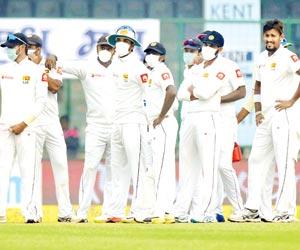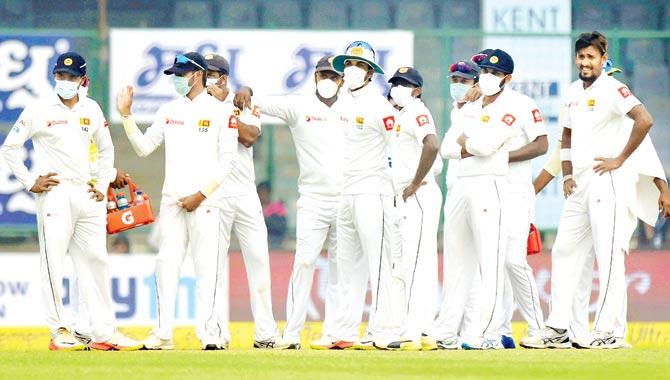Feroz Shah Kotla is a venue that has attracted controversy like moths to a flame, and the latest smog issue will not leave happy memories

Sri Lankan players wear anti-pollution masks during the third Test against India at Feroz Shah Kotla in New Delhi on Tuesday. Pic/PTI
 If a history on the Feroz Shah Kotla is to be written, it won't be a glorious one. It's a venue that has attracted controversy like moths to a flame and therefore some find it hard to believe that Delhi continues to be a leading cricket destination in India. The pollution controversy in the just-concluded India v Sri Lanka Test match provides for another example of visiting teams not having happy memories of an international game there.
If a history on the Feroz Shah Kotla is to be written, it won't be a glorious one. It's a venue that has attracted controversy like moths to a flame and therefore some find it hard to believe that Delhi continues to be a leading cricket destination in India. The pollution controversy in the just-concluded India v Sri Lanka Test match provides for another example of visiting teams not having happy memories of an international game there.
ADVERTISEMENT
The Sri Lankans experienced the rough end of the stick in 2009 as well, when Kumar Sangakkara's one-day team had to bat on a dangerous Kotla pitch for 23.3 overs before the December 27 match was abandoned by International Cricket Council match referee Alan Hurst. The former Australia fast bowler said he considered using the adjoining pitch, but it was not "adequately prepared."

Sri Lankan players wear anti-pollution masks during the third Test against India at Feroz Shah Kotla in New Delhi on Tuesday. Pic/PTI
The pitch fiasco put the Kotla's 2011 World Cup match allotment in jeopardy, but the ban was short enough for Delhi to host four World Cup games; including the India vs Netherlands contest on March 9. Clearly, nothing has been learnt from the past. The 1996 touring Australian team under Mark Taylor were not impressed with the dust bowl prepared for them in the one-off Test at Delhi, which witnessed the start of the Border-Gavaskar Trophy contests. Taylor bemoaned the fact that his team had two days and a session of cricket in Patiala to prepare for the Test. And journalist Malcolm Knox wrote in Taylor & Beyond about how the Australians were "besieged by unauthorised visitors" in their dressing room.
Eleven wickets had fallen by the end of the first day and according to Knox's book, umpire Peter Willey called it the worst first-day pitch he had ever seen. It was an engrossing Test match that was highlighted by Nayan Mongia's century and Anil Kumble's match figures of 9 for 130; besides, of course, Steve Waugh's fighting 67 not out after getting out for a duck in the first innings. That crumbling Delhi track brought out the supreme warrior in him. It is sad that the capital of India has not provided touring teams happy memories. The West Indies — the first overseas team to play a Test at the Kotla — encountered discomfort. Jeff Stollmeyer, the team's accomplished opening batsman, maintained a diary on the side's 1948-49 tour of India. His jottings were meant for his wife and not for public consumption. But several years after Stollmeyer's 1989 death, his son Brian decided to publish his father's entries in a book form. The inconvenience in Delhi was not missed. Stollmeyer described the dressing room as "small, dark and dusty; no towels, soap, glasses, or anything else were provided."
He slammed the team manager Donald Lacy too. "It is a pity, and frankly, our manager has been too busy accepting compliments and flattery from the opposition, instead of insisting on elementary comforts for the members of the team." "Actually, Delhi does not seem to be very cricket-or Test-match conscious, and the management at the Willingdon Club ground, which resembles a county ground in England rather than a Test match venue, is something shocking," wrote Stollmeyer. It's easy to be cynical of those who criticise facilities and conditions at Indian grounds, but there should be some level of sympathy too, for what they have to go through. Conversely, India's complaints over overseas facilities must be taken in the right spirit too, and yes, there have been some teams who see a conspiracy in everything. Keith Stackpole, the former Australian opening batsman, admitted in his book, Not Just For Openers, that the Australian team roped in local help to ensure the pitch was not patched up during the night after the fourth day's play, which would have helped India to achieve their 181-run target in the 1969-70 Test. "Very suspicious people, we were. However, the wicket wasn't touched, and they made the runs easily," wrote Stackpole. However, off-spinner Ashley Mallett, who claimed 28 wickets in that Test series, was told many years later by an Indian player that there was something done to the pitch overnight. Though Mallett felt there was no reason why that Indian cricketer would pull a fast one on him, this story is bizarre.
Coming back to the smog controversy, it's a pity that the matter comes at a time when the Delhi cricket bosses agreed to name stands after greats Bishan Singh Bedi and Mohinder Amarnath. Before them, an honour came Virender Sehwag's way, when a gate was named after him. There is nothing much one can do about a weather situation. But the pollution issue of the 2017 India v Sri Lanka Test will surely be a chapter in that yet-to-be-written history of the Kotla.
mid-day's group sports editor Clayton Murzello is a purist with an open stance. He tweets @ClaytonMurzello Send your feedback to mailbag@mid-day.com
Catch up on all the latest sports news and updates here
Download the new mid-day Android and iOS apps to get updates on all the latest and trending stories on the go
 Subscribe today by clicking the link and stay updated with the latest news!" Click here!
Subscribe today by clicking the link and stay updated with the latest news!" Click here!






